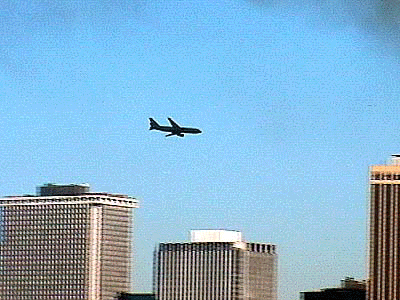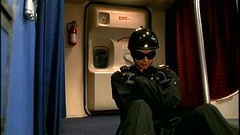
Fridays are all about escape. All you need to do is flip through the weekend arts section of the newspaper, a menu of evasions of the real. This week it's another upbeat baseball movie from the ubiquitous Brad Pitt, three more variations on corporate life as apolitical action thriller (the commuter version in Drive starring Ryan Gosling, the retro remix version in the Jason Statham/Robert DeNiro/Clive Owen reinvention of The Killer Elite (how I wish someone really could channel Peckinpah for our post-GWOT culture), and the teen wolf wet dream version in Abduction of Taylor Lautner (they're not your real parents!)), and best of all, the ever-grunting über-Spartan Gerard Butler in Machine Gun Preacher (aka, What Would Jesus Shoot?)

On television, the escape is beyond an alternate present, into an alternate past. The success of Mad Men has shown Hollywood that, in a world where the present is apocalyptic and the future no longer exists, the past is the place we will go to happily watch commercials—indeed, the shows are all commercials for an imagined version of the past, when they're not anachronized versions of our favorite old commercials. Pan Am, The Playboy Club, Boardwalk Empire, even Game of Thrones...we like our product placement to occur in beautifully curated cathode ray nostalgia bubbles. As Alessandra Stanley says in her review of Pan Am, "When the present isn’t very promising, and the future seems tapered and uncertain, the past acquires an enviable luster."

Pan Am even imagines a time when there were cute revolutionaries in our midst imagining a better world: "Christina Ricci plays Maggie, a closet beatnik who wears the Pan Am uniform to see the world but at home listens to jazz and studies Marx and Hegel."

What a perfect semiotic response to the state of things in the world after 9/11, itself an evolved derivative of the Lockerbie Bombing, by imagining oneself eternally flying the airline that represented the dream of a shiny corporate everyday interplanetary 2001? Especially if you revisit the decade that just passed, in Mark Danner's amazing piece in this week's New York Review of Books—"After September 11: Our State of Exception." Danner conveys the catalyzing power of the historical change when wars between states were as relevant as a vintage game or Risk, and the duty of the sentinel was to protect the monolithic state from elusive and conceptually intangible networks:
[M]ake no mistake, the critical decisions laying the basis for the state of exception were made in a state of anxiety and fear. How could they not have been? After September 11, as Richard Clarke put it simply, “we panicked.” Terrorism, downgraded as a threat by the incoming Bush administration, now became the single all-consuming obsession of a government suddenly on a “war footing.”
Every day the President and other senior officials received the “threat matrix,” a document that could be dozens of pages long listing “every threat directed at the United States”10 that had been sucked up during the last twenty-four hours by the vast electronic and human vacuum cleaner of information that was US intelligence: warnings of catastrophic weapons, conventional attacks, planned attacks on allies, plots of every description and level of seriousness. “You simply could not sit where I did,” George Tenet later wrote of the threat matrix, “and be anything other than scared to death about what it portended.”11
One official compared reading the matrix every day—in an example of the ironic “mirroring” one finds everywhere in this story—to “being stuck in a room listening to loud Led Zeppelin music,” which leads to “sensory overload” and makes one “paranoid.” He compared the task of defending the country to playing goalie in a game in which the goalie must stop every shot and in which all the opposing players, and the boundary lines, and the field, are invisible.12
All this bespeaks not only an all-encompassing anxiety about information—about the lack of map rooms displaying the movements of armies, the maddening absence of visible, identifiable threats, the unremitting angst of making what could be life-and-death judgments based on the reading and interpreting of inscrutable signs—but also, I think, guilt over what had been allowed to happen, together with the deep-seated need to banish that guilt, to start again, cleansed and immaculate. Thus “the War on Terror”—a new policy for a new era, during which the guardians of the nation’s security could boast a perfect record: no attacks on American soil. The attacks of September 11 would be banished to a “before time” when the “legalistic” Clinton rules applied, before “the gloves came off.” The successful attack could thus be blamed on the mistaken beliefs of another time, another administration. The apocalyptic portal of September 11 made everything new, wiping out all guilt and blame.

No wonder my son, raised in the Cheney/Obama decade, gravitates toward the vinyl records of the 1970s. 9/11 succeeded in flipping the switch that turns our media culture into a giant fear-based psyop on ourselves. If I unleash my Jack Bauer action figure inside the screen of Pan Am, will he fall in love and settle down in the peaceful interregnum that never existed during the long war of the twentieth century? Maybe his lover will be Christina Ricci's New Left stoner, and she and Jack will partner up to foment a revolutionary atemporal mashup in the mediascape of the early 21st century. Better futures are there for those unafraid to leap into the Nietzschian uncertainty of tomorrow.

Isn't it better to punch through the exit door than assume crash positions? Don't believe what the flight attendants tell you: it is always your right to go into the cockpit.

2 comments:
I rather like Mad Men, though I always watch it wondering when it'll all end up in Vietnam. The war in SE Asia stands as a cultural beacon, a reply to America's self-image created in WWII. It's the subtext to every macho fantasy of the '70s, KEW's Kane, the Wild Bunch, TV cops & more. I've drifted from MM, but that's just where I go.
I've only seen a bit of Boardwalk Empire & like it so far. I do find tales of sleazy ward-heelers & gangsters a trifle reassuring. It should be disturbing that corruption was so deeply ingrained into American life. But compared to Los Zetas (the kind of guys that leave bagfuls of severed heads in the street), the Prohibition Syndicate seems positively quaint.
American culture reacted to Prohibition, WWII, & Vietnam in certain distinct ways. How will we process Iraq & the Drug Wars?
Dave — Great point about the Vietnam War subtext of the television of the 70s. I think 24 and torture porn are how we processed the GWOT. How we process this strange new decade of profound uncertainty and destabilization remains to be seen. -- Chris
Post a Comment